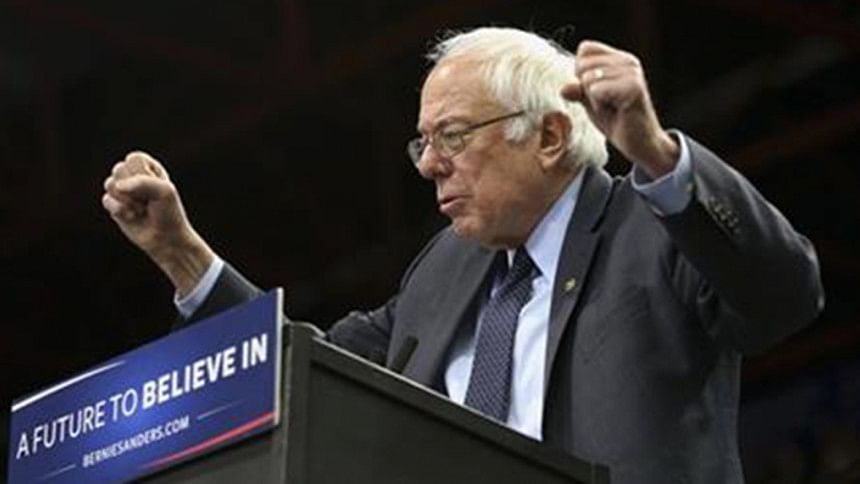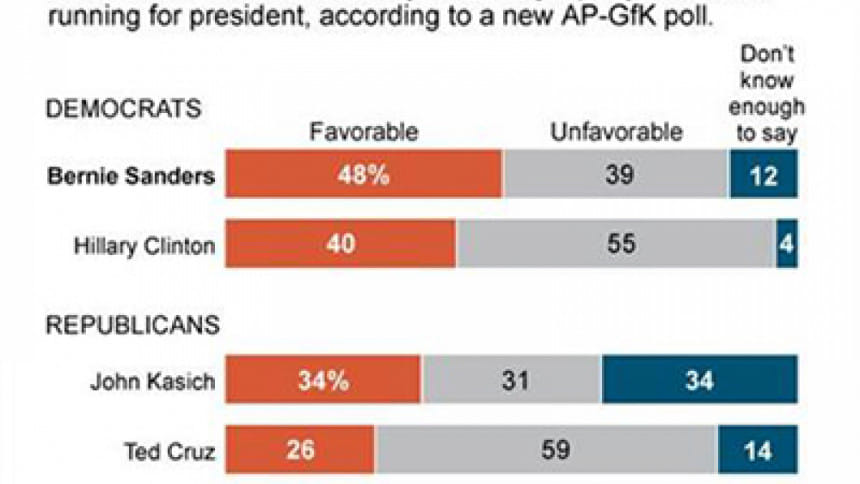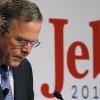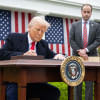Sanders lags in delegates but leads in likability

Bernie Sanders is still behind when it comes to delegates and votes, but he has one clear advantage over his Democratic and Republican presidential rivals — a lot of people actually like him.
By 48 percent to 39 percent, more Americans have a favorable than an unfavorable opinion of Sanders, giving him the best net-positive rating in the field, according to a new Associated Press-GfK poll. Unlike the other candidates, Sanders also is doing better as more Americans get to know him: His favorable rating is up from an earlier AP-GfK poll.
The numbers speak to Sanders' rapid rise from a relatively unknown Vermont senator to a celebrated voice proclaiming political revolution. They also reflect just how unpopular the rest of the field is.
But the growing popularity may be coming too late for Sanders, who lags behind Democratic front-runner Hillary Clinton, with time running out in the primary campaign.
After winning the Democratic caucuses in Wyoming on Saturday, Sanders has now won seven of the past eight state contests. Still, to win the Democratic nomination, he must take 68 percent of the remaining delegates and uncommitted superdelegates, which would require a sudden burst of blowout victories.
"I just like everything that he talks about and that he wants to do," said Brian Cane, 54, of Spokane, Washington. "I think Hillary, she's too mainstream government. Bernie Sanders is fresh and new and the Republicans are freaking idiots."
Still, Cane echoed the sentiments of many Democrats, saying that if Clinton wins the primary, "Yeah, I'll vote for her."
The poll was conducted March 31-April 4, before Sanders and Clinton sparred publicly over who was best qualified to be president.
Sanders' popularity stands in contrast to the rest of the remaining candidates. Clinton gets unfavorable ratings from 55 percent of Americans, while just 40 percent have a favorable opinion. A whopping 69 percent of Americans have an unfavorable view of Republican leader Donald Trump, and just 26 percent have a favorable opinion.

Among Democrats, 72 percent have a favorable opinion of Sanders and 20 percent have an unfavorable opinion. That's similar to Democrats' rating of Clinton. It's also improved from 61 percent who had a favorable view of Sanders in February, while his unfavorable rating remained stable.
"I've grown to like him more. The exposure that he's getting, there's a bit of a snowball effect with his campaign," said Les Blackmore, 60, of Washington, DC, who is leaning toward Sanders.
Twenty-three percent of Republicans and 38 percent of independents have a favorable view of Sanders, while 67 percent of Republicans and 32 percent of independents give him negative ratings. Just 7 percent of Republicans and 21 percent of independents rate Clinton positively.
About 61 percent of registered voters say they'd at least consider voting for Sanders in a general election, while 38 percent said they would definitely not. The percentage saying they would not vote for him is the lowest in the entire field. Fifty-one percent say they wouldn't vote for Hillary Clinton, though she still does better than any of the Republican candidates on that measure. Sixty-three percent say they wouldn't vote for Trump.
Sanders is the only candidate remaining in the field on either side who's viewed as at least somewhat honest, compassionate, civil and likable by a majority of Americans.
Fifty-eight percent say he's at least somewhat civil, compared with 48 percent for Clinton and just 15 percent for Trump. Likewise, 58 percent call him at least somewhat compassionate, compared with 42 percent for Clinton and 17 percent for Trump.
"I do like both of them," said Tami Cinquemani, 55, of Apopka, Florida, who voted for Clinton. "I feel like Hillary is more qualified. ... I like Bernie. Honestly I wouldn't be disappointed either way."
Though Sanders is more popular, Clinton remains the candidate viewed by the most Americans as able to win a general election, with 82 percent saying she could capture the White House. Just 6 in 10 say that of Sanders or Trump.
The AP-GfK Poll of 1,076 adults was conducted online March 31-April 4, using a sample drawn from GfK's probability-based KnowledgePanel, which is designed to be representative of the US population. The margin of sampling error for all respondents is plus or minus 3.3 percentage points.
Respondents were first selected randomly using telephone or mail survey methods and later interviewed online. People selected for KnowledgePanel who didn't otherwise have access to the Internet were provided access at no cost to them.

 For all latest news, follow The Daily Star's Google News channel.
For all latest news, follow The Daily Star's Google News channel. 








Comments